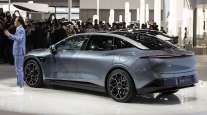Bloomberg News
Automakers Blitz Congress to Fix an EV Tax Credit They Can’t Use

[Stay on top of transportation news: Get TTNews in your inbox.]
Automakers including Ford Motor Co., General Motors Co. and Toyota Motor Corp. are making a last-ditch lobbying push to change Democrats’ proposed new spending bill over concern that they stand to lose out from strict new limits on electric vehicle credits.
An extension of the popular $7,500 tax credit available to EV buyers was included in the surprise breakthrough deal reached by Sen. Joe Manchin and Senate Majority Leader Chuck Schumer last week. Manchin, a West Virginia Democrat, has long been a skeptic of the credit, dismissing it as “ludicrous” and arguing that it subsidizes production of Chinese-made batteries.
The extension was a huge win for companies such as General Motors Co. and Tesla Inc. that had reached a 200,000-EV-sales threshold at which the perk begins to phase out. But to win Manchin’s support, the credits also included tough new limits on how much the EVs can cost, how much income their buyers can earn, and where the batteries and vehicles are made. With the Senate seeking to pass the hard-fought compromise bill in coming days, automakers are running out of time to get the tax credit rules tweaked.

Stabenow
“Unfortunately, after they are implemented, at this point it looks like companies won’t be able to use them in the short run,” said Sen. Debbie Stabenow, a Michigan Democrat who has been instrumental in the negotiations over the credits.
Limiting the credit could hamper President Joe Biden’s goal of making 50% of new vehicle sales emission-free by 2030, a move he said was needed to help curb climate change. Anyone seeking big changes to the climate and spending package faces long odds because of the momentum among Senate Democrats who for over a year have been seeking a deal that Manchin would bless.
So far, automakers aren’t making much headway, with senators unwilling to consider any substantial changes that would upset support for the bill, according to people familiar with the talks who asked not to be identified.
Among the restrictions of most concern: Requirements that would render EVs made with any battery components manufactured by China and other “foreign entities of concern” ineligible to receive the credit after 2023. And beginning in 2025, that prohibition extends to the use of any critical mineral in a battery that is extracted or processed by those countries.
That could pose a big hurdle to automakers that have a connection to the Chinese supply chain. The processing of critical minerals typically used in EV batteries, such as lithium, nickel cobalt, and manganese, is done almost exclusively in China, said Morgan Bazilian, director of the Payne Institute at the Colorado School of Mines.
“The processing piece is an enormous issue for all of this,” Bazilian said. “What battery manufacturers need is processed chemicals, not rocks.”
Ford, General Motors, Toyota and Stellantis NV are lobbying for more time to comply with those content requirements, according to people familiar with the matter. The companies are making their case to lawmakers including Manchin, Schumer and Stabenow to extend the start of those requirements by multiple years, the people said.

Georgia Gov. Brian Kemp checks out a Rivian electric pikcup truck during the announcement of a plant coming to the state. (John Bazemore/Associated Press)
Other automakers, such as electric car maker Rivian Automotive LLC, are lobbying to extend the transition time before new limits on vehicle price and income for buyers take affect. The Senate spending deal would cap the credit to an income level of $150,000 for a single filing taxpayer and $300,000 for joint filers for new vehicles. It also includes a cap on the suggested retail price of eligible vehicles of $55,000 for new cars and $80,000 for pickups and SUVs.
That effectively excludes many Rivian models, which cross that price point as options to the vehicles are added, said James Chen, Rivian’s vice president of public policy. The company has sold about 7,000 vehicles, far from the existing 200,000 vehicle cap, but the new limits would take affect starting next year.
“If the legislation is passed as drafted it pulls the rug out — it cuts Rivian out entirely,” Chen said. “Congress is throwing up a big stop sign to American-made electric trucks and SUVs.”
General Motors said it is eager to remove the 200,000-vehicle limit for individual manufacturers — a level that both it and Tesla hit in 2018, triggering a phaseout on the credit available to buyers of their EVs.
“We remain hopeful that Congress will advance legislation to address energy and economic security that includes a modification to the EV tax credit,” a GM spokesman said in an email.
Want more news? Listen to today's daily briefing above or go here for more info
The underlying legislation, which overall contains some $370 billion in funding for tax credits and other measures to combat climate change, also includes aid to help automakers develop a domestic battery supply chain.
It includes as much as $20 billion in loans for the construction of new clean vehicle manufacturing facilities, $2 billion in grants to retool existing auto manufacturing facilities to make clean vehicles and a $10 billion investment tax credit to build clean technology production sites, according to a summary of the bill by the Zero Emission Transportation Association.
“Nearly every part of the effort to secure our supply chain is getting some level of support in the bill,” said Joe Britton, head of the Zero Emission Transportation Association.
— With assistance from Keith Laing, Gabrielle Coppola, David Welch and Steven T. Dennis.




